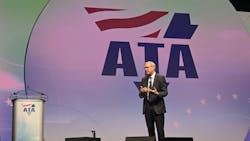ATA's Spear jabs at billboard lawyers, 'bark-licking bureaucrats' in annual address
SAN DIEGO—It’s hard to ever call the picturesque San Diego Bay gloomy, even on an overcast October day, but the morning economic update on Oct. 27 from Bob Costello, chief economist and SVP for the American Trucking Associations, at the trucking group's Management Conference and Exhibition, could dampen even the sunniest of dispositions. Today, Costello was the groundhog popping up to tell the crowd there would be six (or more) months of freight recession.
He attributed it to the tariffs President Donald Trump is using as a "blunt tool" to beat back years of global trade inequity. In this trade war, like in any war, "there's going to be casualties—and it's going to hurt, especially around U.S. manufacturing,” Costello remarked.
None of this is all that revelatory if you've been staying abreast of the latest forecasts from trucking economists and recent Class 8 sales volumes. The question is how will the industry's fleet leaders and other stakeholders, such as truck manufacturers, respond?
Speaking with many over the past three days, we can say they are just waiting for some daylight to break through, something to illuminate the uncertainty. Fittingly, that afternoon as the clouds burned away over the bay and convention center, ATA President and CEO Chris Spear took to the stage for his annual address to members.
Referencing Costello's earlier report, Spear, too, began with some hard truths.
“We are in a market situation where demand remains low… and capacity is far too high,” Spear began to the packed crowd at the San Diego Convention Center. “And while cyclical freight is not uncommon, this is the third straight year the industry is feeling the pain of a freight recession.”
Coming out of the COVID pandemic, that protracted downturn seems even longer. And it’s exacerbated by the chaotic political climate, where election results swing the policy pendulum wildly from one extreme to the other, not only for the economy but the regulatory environment as well.
Just last year, fleets had to prepare for federal and state emissions rules that would force them to rapidly scale zero-emission vehicle adoption. This year, under President Donald Trump, the EPA is attempting to undo more than a decade of environmental regulations.
And next year, things could change even more—or stay the same. No one here at MCE really knows for sure. It’s left companies making, operating, and supporting the trucking industry anxious and antsy, not knowing what to expect.
“With more than three decades in government relations, I have never witnessed anything close to what we’re navigating right now,” Spear noted.
The ATA, though, prefers the anti-regulatory stance of the current administration, with Spear assuring its members the government is here to help trucking.
“President Trump and the Republican-led Congress have wasted zero time moving several ATA priority issues,” he asserted.
Chief among these is the attack on emissions regulations. Trump has undercut California Air Resource Board's major plans to eliminate ICE engines by removing crucial Clean Air Act waivers, while the EPA is currently trying to remove the Endangerment Finding that serves as the foundation for more than a decade of policies around greenhouse gases.
The EPA is also relaxing its stance on diesel exhaust fluid faults in trucks. When a diesel truck runs out of DEF or the system detects certain faults, the truck enters "limp mode" until it's resolved. EPA Administrator Lee Zeldin is working with OEMs to update software to give a much wider grace period, greatly enhancing uptime across roads and farms.
Trump has also plugged the flow of billions in clean energy funding authorized under the tenure of his predecessor, Joe Biden, and the previous Congress, who were quick to hand out clean energy funding without considering the implications or feasibility.
"President Biden's infrastructure bill may have provided 38% more funding for roads and bridges, but it did nothing to build out the electric infrastructure California required, which ended up amounting to a $1 trillion unfunded mandate," Spear asserted. "According to ATRI, California's scheme would have required our national grid to supply 40% more power to charge all of our trucks. That's more than a little ironic, coming from a state that's infamous for blackouts."
Spear also credited the ATA's lobbying efforts as vital to helping Congress finally see the light in regards to policies harming trucking, and thus the nation's economy.
"The first seven months of this Congress, ATA testified seven times on Capitol Hill, communicating your priorities directly to members of Congress," Spear boasted.
“We were the key witness in countless hearings before the House and Senate, telling lawmakers how California’s bark-licking bureaucrats might as well be forcing us to move the nation’s freight with donkey carts,” Spear offered, garnering a chuckle from the crowd. “We took that message directly to then-candidate President Trump in Florida last summer. We left nothing on the table.
“That’s advocacy at its best, and it’s paved the way for certainty, growth, and a sustainable future for our industry and the environment,” Spear continued. “We have one last major domino to fall: EPA’s Low NOx rule.”
Spear called the rule “effective” but untested, and “littered” with added costs per power unit.
“Our conversations with the EPA are ongoing and we’re pushing for an immediate answer on their reopening, delaying, and changing the rule,” he promised the audience.
The emissions fight is still ongoing, with CARB and Trump's many opponents looking to stall or reverse the EPA's emissions regulation rollbacks. And as ATRI's latest list of top fleet concerns highlights, lawsuit abuse and related insurance costs are as painful for trucking as the poor economy.
“Our success this year is a reflection of who we are, what we stand for, and what it all means to the more than 340 million Americans who depend on trucking each day,” he said. “That reflection is reality.”
Other ATA policy work
Driver requirements
Spear also discussed recent driver requirements with the acknowledgment that the current freight recession has shifted this issue’s impact on the industry.
“Given the freight recession, we’re not feeling the impact of a driver shortage like we have in past years,” he noted. “But like every unsolved problem, this issue isn’t going away.”
But he continued to note that the shortage is less about finding any common driver to fill seats and move freight, but about those with the qualifications fleets need.
“We don’t lack people with CDLs,” Spear said. “What we lack is a number of qualified drivers who meet our high standards of professionalism and safety.”
Here, ATA’s CEO aligned the organization with the DOT’s English Language Proficiency requirement for drivers, highlighting how drivers must be able to read road signs, understand safety rules, and not abuse alcohol or drugs.
“The ATA supports Transportation Secretary Duffy’s efforts to crack down on states that refuse to enforce the federal English Language Proficiency requirement; suspend visas for foreign truck drivers while audits and investigations are conducted; require every state to root out bad actors who jeopardize the safety of our nation’s highways, including entry level driver training standards; and, target rogue actors who abuse US drivers by illegally handing foreign B1 visa drivers their loads to avoid paying higher wages.”
Lawsuit abuse
Additionally, Spear highlighted how the association has worked on one of its tier-1 issues, what he called “declar[ing] war on the trial bar.”
“We supported our state associations with the highest chances of passing lawsuit abuse legislation – ranging from seatbelt gag rules and phantom damages to the more complicated bills that cap damages,” Spear explained.
Now, he noted that the association will continue to encourage states to pass tort reform, while also aiming for federal reforms as well. In particular, he shouted out how Representatives Mike Collins (R-Georgia), Tom Tiffany (R-Wisconsin), Brandon Gill (R-Texas), and Harriet Hageman (R-Wyoming) recently introduced the “Lawsuit Abuse Reduction Act” in September.
“For the first time, ATA is putting a secondary lawsuit abuse strategy to advance federal legislation into full motion, further kicking the plaintiffs’ bar to the curb,” Spear said.
Looking forward for the ATA
However, even with these gains, the ATA’s president and CEO also said that the association was keeping an eye on how the economy is continuing to impact fleets, including the administration’s use of tariffs.
“As for tariffs, ATA has and will continue to oppose any elevating use of tariffs that adversely impact the movement of freight,” he asserted. “The President, however, believes strongly in tariffs as a policy tool. That’s not going to change.”
That said, Spear said the ATA will continue to object to this tactic without undoing the association’s work on other fronts. He did acknowledge that if the current tariffs extend the freight recession, “ATA may well consider strategic shifts” to address those impacts.
But ultimately, Spear ended his speech on a more positive note than he began it, with a focus on the ATA’s determination to continue advocating for trucking.
“Stay the course,” he concluded. “Don’t concede anything to the plaintiffs’ bar and union bosses. Like you, ATA is doing more with less, and we’ll continue that as long as it takes.”
About the Author

John Hitch
Editor-in-chief, Fleet Maintenance
John Hitch is the award-winning editor-in-chief of Fleet Maintenance, where his mission is to provide maintenance leaders and technicians with the the latest information on tools, strategies, and best practices to keep their fleets' commercial vehicles moving.
He is based out of Cleveland, Ohio, and has worked in the B2B journalism space for more than a decade. Hitch was previously senior editor for FleetOwner and before that was technology editor for IndustryWeek and and managing editor of New Equipment Digest.
Hitch graduated from Kent State University and was editor of the student magazine The Burr in 2009.
The former sonar technician served honorably aboard the fast-attack submarine USS Oklahoma City (SSN-723), where he participated in counter-drug ops, an under-ice expedition, and other missions he's not allowed to talk about for several more decades.

